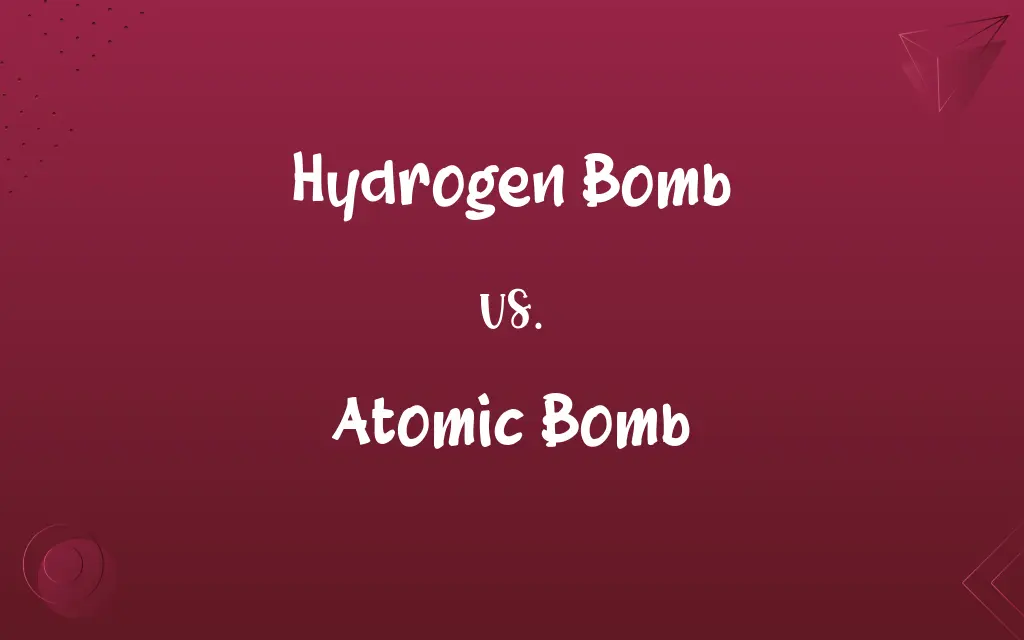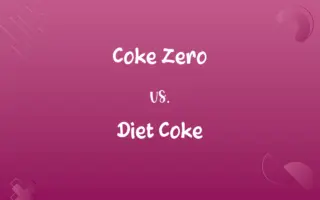Hydrogen Bomb vs. Atomic Bomb: Know the Difference

By Shumaila Saeed || Updated on December 25, 2023
A hydrogen bomb (thermonuclear bomb) uses nuclear fusion of hydrogen isotopes to release energy, whereas an atomic bomb (nuclear bomb) uses nuclear fission to release energy.

Key Differences
The hydrogen bomb operates on the principle of nuclear fusion, where hydrogen isotopes are fused to form helium, releasing massive energy. The atomic bomb, in contrast, functions on the principle of nuclear fission, where the nucleus of a heavy atom, like uranium or plutonium, is split into smaller parts.
Shumaila Saeed
Dec 10, 2023
Hydrogen bombs release energy through the fusion of light atoms and are significantly more powerful than atomic bombs. Atomic bombs derive their explosive power from the fission of heavy atomic nuclei and have comparatively lower yield than hydrogen bombs.
Shumaila Saeed
Dec 10, 2023
Hydrogen bombs were developed after atomic bombs, representing a more advanced and complex stage in nuclear weapons technology. The atomic bomb was the first type of nuclear weapon developed and used, notably in World War II.
Shumaila Saeed
Dec 10, 2023
The design and construction of a hydrogen bomb are more complex, requiring an initial fission reaction to trigger fusion. Atomic bombs have a simpler design, relying on a critical mass of fissile material to initiate an uncontrolled fission chain reaction.
Shumaila Saeed
Dec 10, 2023
The explosive yield of hydrogen bombs is measured in megatons of TNT, indicating their vastly superior power. Atomic bombs typically have yields measured in kilotons of TNT, reflecting their relatively lower power.
Shumaila Saeed
Dec 10, 2023
ADVERTISEMENT
Comparison Chart
Principle
Nuclear fusion of hydrogen isotopes
Nuclear fission of heavy elements like uranium or plutonium
Shumaila Saeed
Dec 10, 2023
Energy Release
Extremely high, measured in megatons
Relatively lower, measured in kilotons
Shumaila Saeed
Dec 10, 2023
Development
Developed after the atomic bomb
First type of nuclear weapon developed
Shumaila Saeed
Dec 10, 2023
Design Complexity
More complex, requires a fission reaction to initiate fusion
Simpler, requires critical mass of fissile material
Shumaila Saeed
Dec 10, 2023
Explosive Yield
Higher, resulting in more destructive capacity
Lower compared to hydrogen bombs
Shumaila Saeed
Dec 10, 2023
ADVERTISEMENT
Hydrogen Bomb and Atomic Bomb Definitions
Hydrogen Bomb
A hydrogen bomb generates energy by fusing hydrogen isotopes.
The development of the hydrogen bomb marked a significant advancement in nuclear technology.
Shumaila Saeed
Dec 04, 2023
Atomic Bomb
Atomic bomb, a weapon of mass destruction, works on nuclear fission.
Atomic bombs were the first type of nuclear weapons developed.
Shumaila Saeed
Dec 04, 2023
Hydrogen Bomb
Hydrogen bomb, a more advanced nuclear weapon, relies on fusion.
The hydrogen bomb is considered a second-generation nuclear weapon.
Shumaila Saeed
Dec 04, 2023
Atomic Bomb
Atomic bomb is a nuclear device based on uncontrolled fission chain reactions.
The development of the atomic bomb marked a pivotal moment in military history.
Shumaila Saeed
Dec 04, 2023
Hydrogen Bomb
Hydrogen bomb is a nuclear device with immense destructive power due to fusion reactions.
Hydrogen bombs are characterized by their unprecedented explosive yield.
Shumaila Saeed
Dec 04, 2023
ADVERTISEMENT
Atomic Bomb
An atomic bomb is a nuclear weapon that uses fission reactions.
The atomic bomb dropped on Hiroshima changed the course of World War II.
Shumaila Saeed
Dec 04, 2023
Hydrogen Bomb
A hydrogen bomb is a thermonuclear weapon that uses nuclear fusion.
The hydrogen bomb tested by the country has raised international concerns.
Shumaila Saeed
Dec 04, 2023
Atomic Bomb
An atomic bomb generates explosive energy through nuclear fission.
The atomic bomb's impact in warfare highlighted the need for nuclear disarmament.
Shumaila Saeed
Dec 04, 2023
Hydrogen Bomb
A hydrogen bomb is characterized by its fusion-based explosive mechanism.
Hydrogen bombs pose a severe threat due to their high explosive power.
Shumaila Saeed
Dec 04, 2023
Atomic Bomb
An atomic bomb releases energy by splitting heavy atomic nuclei.
The destructive power of an atomic bomb stems from its fission process.
Shumaila Saeed
Dec 04, 2023
Repeatedly Asked Queries
What is a Hydrogen Bomb?
A Hydrogen Bomb, also known as a thermonuclear bomb, is a type of nuclear weapon that uses a combination of nuclear fusion and fission to produce a massive explosion.
Shumaila Saeed
Dec 10, 2023
What is the principle of fusion in a Hydrogen Bomb?
Fusion in a Hydrogen Bomb involves combining lighter atomic nuclei (like hydrogen isotopes) to form a heavier nucleus, releasing a tremendous amount of energy.
Shumaila Saeed
Dec 10, 2023
Is a Hydrogen Bomb more powerful than an Atomic Bomb?
Yes, a Hydrogen Bomb is significantly more powerful than an Atomic Bomb, capable of producing explosions thousands of times stronger.
Shumaila Saeed
Dec 10, 2023
How does a Hydrogen Bomb work?
It works by using an initial atomic explosion to compress and heat fusion fuel (like hydrogen isotopes) to a point where nuclear fusion occurs, releasing enormous energy.
Shumaila Saeed
Dec 10, 2023
Can a Hydrogen Bomb's power be controlled?
The power of a Hydrogen Bomb can be varied by changing the amount and types of fusion fuel and the design of the bomb, but once initiated, the explosion cannot be controlled.
Shumaila Saeed
Dec 10, 2023
What are the key components of a Hydrogen Bomb?
Its key components include a fission bomb, fusion fuel (like deuterium and tritium), and a casing capable of withstanding extreme temperatures and pressures.
Shumaila Saeed
Dec 10, 2023
Have Hydrogen Bombs been used in conflict?
Hydrogen Bombs have never been used in military conflict; their use has been limited to testing.
Shumaila Saeed
Dec 10, 2023
Who invented the Atomic Bomb?
The Atomic Bomb was developed during World War II by the United States under the Manhattan Project, led by scientists like J. Robert Oppenheimer.
Shumaila Saeed
Dec 10, 2023
Are Hydrogen Bombs banned?
While there's no specific ban on Hydrogen Bombs, various international treaties restrict their testing and proliferation.
Shumaila Saeed
Dec 10, 2023
How does an Atomic Bomb work?
It works by splitting heavy atomic nuclei (like uranium or plutonium) into smaller nuclei, releasing energy and more neutrons, causing a chain reaction.
Shumaila Saeed
Dec 10, 2023
Who invented the Hydrogen Bomb?
The concept was primarily developed by scientists like Edward Teller and Stanislaw Ulam in the United States during the early 1950s.
Shumaila Saeed
Dec 10, 2023
What is an Atomic Bomb?
An Atomic Bomb is a type of nuclear weapon that uses nuclear fission to release a large amount of energy through an explosive reaction.
Shumaila Saeed
Dec 10, 2023
What materials are used in an Atomic Bomb?
The primary materials are fissile isotopes such as Uranium-235 or Plutonium-239.
Shumaila Saeed
Dec 10, 2023
What is the principle of fission in an Atomic Bomb?
Fission in an Atomic Bomb involves the splitting of heavy atomic nuclei into smaller parts, releasing energy and more neutrons, perpetuating the reaction.
Shumaila Saeed
Dec 10, 2023
Can an Atomic Bomb's explosion be controlled?
The explosion itself cannot be controlled once initiated, but the design of the bomb can dictate its yield and the extent of the explosion.
Shumaila Saeed
Dec 10, 2023
What are the environmental impacts of a Hydrogen Bomb?
The environmental impacts include massive destruction, radioactive fallout, long-term ecological damage, and potential impacts on global climate.
Shumaila Saeed
Dec 10, 2023
What was the first use of an Atomic Bomb in war?
The first use was in August 1945, when the United States dropped Atomic Bombs on the Japanese cities of Hiroshima and Nagasaki.
Shumaila Saeed
Dec 10, 2023
Are Atomic Bombs banned?
While the use of Atomic Bombs is not specifically banned, various international treaties and norms discourage their use and regulate their proliferation.
Shumaila Saeed
Dec 10, 2023
What are the effects of an Atomic Bomb explosion?
Effects include a massive blast wave, intense heat, radiation, and significant long-term health and environmental impacts.
Shumaila Saeed
Dec 10, 2023
Is an Atomic Bomb the same as a Nuclear Bomb?
The term "nuclear bomb" is a general term that encompasses both Atomic Bombs (fission bombs) and Hydrogen Bombs (fusion bombs).
Shumaila Saeed
Dec 10, 2023
Share this page
Link for your blog / website
HTML
Link to share via messenger
About Author
Written by
Shumaila SaeedShumaila Saeed, an expert content creator with 6 years of experience, specializes in distilling complex topics into easily digestible comparisons, shining a light on the nuances that both inform and educate readers with clarity and accuracy.









































































